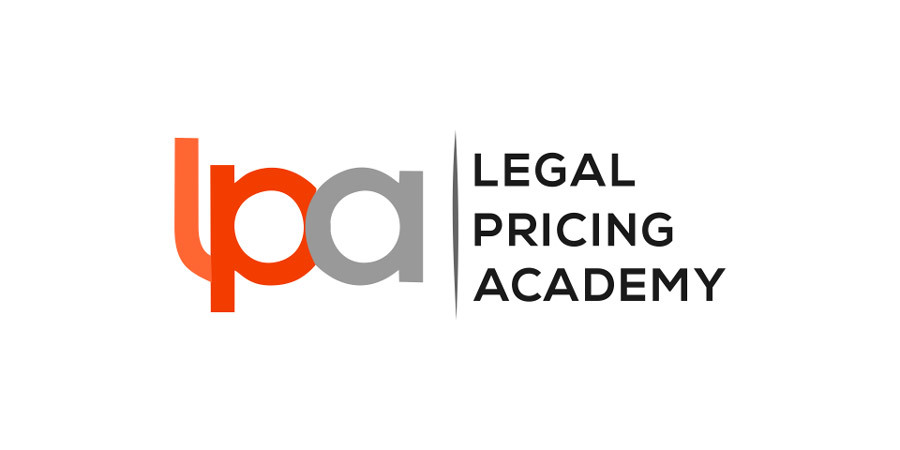With Validatum Pricing Espresso® we aim to bring you your regular pricing 'shot' - the best, most interesting, thought provoking and informative material we can find globally which will be of interest, relevance and help to you in your legal services pricing challenges. [Note: we don't always agree with the content of others that we post but the philosophy of Validatum Pricing Espresso® is shared perspectives, not a personal 'soap-box']

FEATURED....

Procurement Peeves
I was on the train from York to London last Wednesday morning, sitting next to a lady who was diligently scribbling notes onto an RFP document, and I couldn’t help but smile to myself as her colleague proceeded to vilify all procurement professionals the world over as unpredictable, unfathomable, picky and impossible to please.
Apparently deep into a tender response that was due on Friday, they went on to discuss how they’d better not give the client any opportunity to disqualify them and someone had better spell-check it properly this time. (Should just say at this point that they were discrete enough not to mention who they worked for or were tendering to…)
It struck me as a great theme for this month’s blog – how not to aggravate an extremely picky, unfathomable procurement person…I may now work exclusively with law firms but I still have a long list of procurement peeves that I help firms try to avoid!
So, in no particular order…Read more...
Cripps boss on keeping lawyers “lean, mean and hungry”

The firm’s year-end lock-up of just 79 days (consisting of 30 days WIP and 49 days debtors), was the lowest in the top 100 firms. In short, Cripps easily beat its 100-day year-end target.
The firm’s focus on pricing was kick-started around 15 months ago when it brought in Validatum consultant Richard Burcher.
“Richard is a former managing partner and really knows the ropes when it comes to pricing,” says Tyler. “You can’t kid a kidder. It was brilliant watching him challenge partners who’d say, ‘I know what my clients like, and my clients won’t like this’. To which Richard would say, have you asked them?”
In addition to the training, Cripps has introduced a centralised revenue management team which produces bills for fee-earners for everything that is on hourly billing. Fee-earners just need to tick the box and the lawyers are kept away from it, adds Tyler. Read more...
PRICING ECONOMICS....
Clients And Law Firms Rate "Value" Differently

Growing evidence reveals that firms define ‘giving value’ very differently from the way clients assess whether they receive it. There are three simple things a firm can do to get – and stay – on the same page as the executives paying their bills.
A recent review of nearly 100 law firm websites from BigLaw whales to SmallLaw guppies reveals that “delivers value” is the fourth most-overused cliché in legal marketing, following only “experienced,” “client-focused” and “high quality.”
Of course all firms are going to say they deliver value to their clients; if they weren’t doing so, chances are the client would be moving on to new lawyers in short order. The problem is that value is being defined by the law firm, not the client. Read more...
Not Just Pricing: The Power of Monitoring for Recovering Lost Revenue

Pricing groups can be a good starting point for law firms to recover lost revenue, but project monitoring with technology is the necessary next step.
Let's start right in with the pain:
• Realization has hit an all-time low of 83 percent, plunging from 93 percent just a decade ago, according to Peer Monitor. For most Am Law 200 firms, this represents at least $10 million to $20 million in lost revenue. Read more...
Report to Law Firms: 2017 Ain’t Looking Great

Sometimes, the market for legal services appears to move in slow-motion: Each month brings a new report highlighting the same trends – corporate legal departments are expanding, client loyalty is disappearing, law firm profits are under pressure but an elite pack is pulling ahead.
Against this backdrop, on Tuesday, Citi Bank Private Law Firm Group and Hildebrandt Consulting released their analysis of the first nine months of 2016 with an unlikely quote from Winston Churchill:
“To improve is to change, so to be perfect is to have changed often.” Read more...
Client centricity: How to execute and measure ROI

Few would argue that clients’ expectations and buying behaviour with respect to professional services have changed. These structural changes reflect a transition to a buyers’ market, where clients have increasing levels of sophistication and expectation of value. Firms also face demand for better, more client-centric service delivery.
Consequently client centricity is a key strategic imperative for many firms. However, becoming more “client centric” can be a vague goal. While anyone can intuit generalities about client centricity, few focus their efforts on attributes that are empirically proven to be valuable and important to clients. Fewer still have feedback systems which allow them to put the client centricity into competitive context.
This post illuminates what client centricity means, how to execute on what clients really value, and outline the business ROI. Read more...
Lawyers were paid £500m too much

The public overpaid lawyers by nearly £500 million last year for legal services, according to a report published today.
Lawyers do not publicise their charges and the public fail to shop around for the best deal, the report by the Competition and Markets Authority said.
Its year-long study found that there was not enough information on price, quality and service to help people who need legal advice. “Obtaining the right service at good value can therefore be challenging as consumers can face wide variations in the cost of similar services,” it said. “They can also struggle to find enough information to help them identify their legal need.” Read more...
Mid-tier firms struggling to lift profitability, warns new report

The profitability gap between the United Kingdom's most elite firms and those further down the ranks is getting wider and wider, sparking concerns that fee pressures are weighing down mid-level competitors.
A report released by management consultancy firm Edward Drummond & Co has demonstrated that the profit margins for top-tier and mid-tier firms appear to be retreating in opposite directions. While the average percentage of revenue converted into profit at the UK’s top 20 firms has lifted from 30 per cent five years ago to 32.5 per cent this year, profitability has shrunk at those firms ranked between 21 and 100 from 24 per cent to 21 per cent over the same period. Read more...
THE BILLABLE HOUR....
The Intractable Hourly Rate (Perspective)

Over the last few years, a number of surveyed general counsels and law firm leaders have said that alternative fee arrangements (“AFAs”) should displace hourly rates. Yet AFAs are still not as widely used as all of the media hype around them would suggest. According to a BTI Consulting survey released in April of this year, hourly billing arrangements still account for nearly two-thirds of outside counsel spend.
The billable hour would make a fascinating case study for a textbook on behavioral economics. It persists despite decades of criticism and a Great Recession that has put significant power in the hands of clients who, at least in theory, have the greatest ability and motivation to force change. So, why haven’t clients like GE wielded their power to greater effect? Read more...
The Billable Hour Just Won't Die, Report Finds

While alternative fee arrangements are gaining popularity, data recently collected by the consultancy Blickstein Group Inc. shows that discounted hourly billing rates are still much more common than AFAs.
The Ninth Annual Law Department Operations Survey, produced by Blickstein in cooperation with the legal consulting and services company Consilio, looks at feedback from more than 100 law department professionals. A supplement to the report is available here. The full 45-page report, which was provided to Corporate Counsel, is available by request to Blickstein.
The majority of respondents—70 percent—said that between zero and 30 percent of their outside legal work is done through AFAs. Less than 2 percent of respondents said that between 71 and 100 percent of their outside legal work is done through AFAs. Read more...
GlaxoSmithKline Says No to Billable Hours

It turns out eradicating billable hours was not a hard pill to swallow. British pharmaceutical company GlaxoSmithKline has been requesting law firms no longer bill them by the hour, and it appears as if their wish has been granted. In 2015, 84 percent of legal work done for the multi-billion dollar company was performed under an alternative fee arrangement (AFA). This is a huge jump from 2008 when 97% of GSK law firm work was completed using the traditional billable hours model, according to Law.com.
GSK’s campaign to end hourly billing was credited to the company’s general counsel Dan Troy. After arriving from Sidley Austin in 2008, he advocated GSK to seek legal representation using AFAs. According to GSK associate general counsel Bob Harchut, “The mission was to dramatically change the paradigm by which GSK paid for legal services. It was pretty radical to say we’re going to move every new engagement around the world, whenever feasible, to an alternative fee arrangement.” Read more...
PRICING STRATEGY....
Use of AFAs expected to rise next year, says new survey
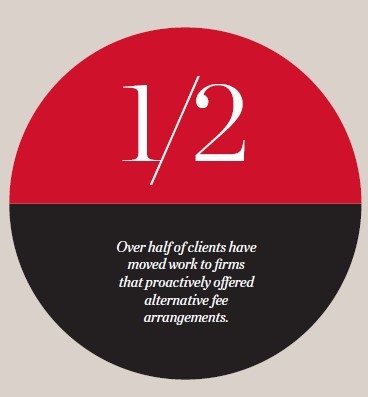
In-house counsel are predicting growth in the use of alternative fee arrangements in the new year.
A recent survey conducted by the Association of Corporate Counsel has found that 50 per cent of chief legal officers and general counsel are expecting the use of alternative fee arrangements to increase in the coming year. The survey results include responses from 300 legal leaders across 37 industries 25 countries.
The report found that those legal departments most highly valued within their organisation were those that maintain consistent budgets, adopt an innovative approach to their work, and utilise management practices to help drive efficiency. Read more...
Using Alternative Fee Arrangements: Proactive or Reactive Seriously Impacts the Bottom Line
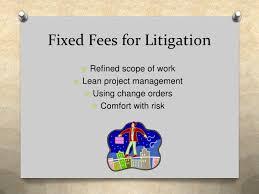
In 1958, the American Bar Association (ABA) published a pamphlet recommending that attorneys track and keep detailed records of their time. For better or for worse, legal work has since been measured by the “billable hour”—the established practice of breaking down an hour’s work into six-minute increments.
This metric appeared unassailable until the economic downturn of 2008. Companies of all sizes began to reevaluate their legal spend, and clients turned a critical eye to the billable hour. As a result, law firms began to widely adopt alternative fee arrangements (AFA), previously used by only a select few firms, as a creative way to tailor legal spend to their clients’ needs.
...Underscoring the importance of AFAs, the survey also found a “7-year trend of compelling success enjoyed by firms that take a proactive approach to alternative fee arrangements.” Read more...
Is 2017 the year the fat smoker quits?

Eleven years ago David Maister published a brilliant article on the barriers to strategic change in professional service firms. In Strategy and the Fat Smoker, he stated...
"Much of what professional firms do in the name of strategic planning is a complete waste of time, no more effective than individuals making New Year’s resolutions (to lose weight or give up smoking)."
David argued that most firms were far too successful to seriously consider any radical shifts in strategy. He argued that unless partners faced imminent existentialist threats, equivalent to cancer or a heart attack, they were just going to pay lip-service to a strategy that involved any sort of change. Read more...
How flat fees ensure profits

Legal Project Management (LPM). It’s a buzzword you hear a lot in the legal industry as the “next big thing.” In fact, managing a matter as a lawyer is as old as the profession itself. What’s different now are the tools available to manage your matter more efficiently and even achieve higher profits. Properly planning a matter ahead of time will also allow you to move towards charging fixed fees, a highly desirable thing for many clients which ultimately will strengthen your relationship.
So let’s look at the profitable benefits of LPM and five tips to successfully implement.
Not every practice is right for fixed fee billing and LPM, but it is hugely beneficial for intricate matters that have many milestones and tasks. Even if you have no intention of setting a fixed fee, your firm will benefit from detailed planning. With proper implementation your project plan means you can assess profitability before you ever start and adjust in real time if needed. Read more...
GENERAL COUNSEL....
You’re not selling what we’re buying

Demand is flat or falling at large law firms, says the newest Wells Fargo survey released yesterday. Revenue is now being driven solely by hourly rate increases, the last remaining income enhancement button that law firms can press and one they will presumably continue to press until it no longer responds. This is not an especially new development: as has been the case every year since 2011, the 2015 Altman Weil survey of Chief Legal Officers found that more law departments decreased their spend on outside law firms than increased it.
But shrinking demand at law firms is not the same thing as shrinking demand among clients. The need for legal services — in the absence of war, famine, or some other Horseman of the Apocalypse — has never decreased year-over-year at any time, anywhere in the world. Populations increase, businesses expand, regulations multiply, opportunities arise, crises metastasize — life continuously grows more complex, and legal needs grow along with that complexity. Read more...
Should Law Firms Fear Losing Clients? (Altman Weil 2016 CLO Survey)
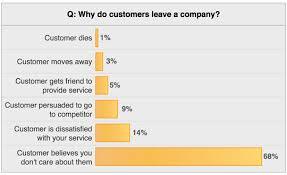
Should law firms fear losing clients? Many do already but just how much should they worry? The2016 Altman Weil CLO Survey provides insight.
The report opens with worrying data:
53% of law departments say they shifted a portfolio of work worth $50,000 or more because of a client service issue; 41% switched to another firm in pursuit of lower fees; and 30% moved their work to a firm that was more effective in managing matters. (page iii)
Answers to the 2016 bonus question illuminate client motivation and size the risk. Here are responses to the question, "Which of the following statements best reflects your law department’s position changing the way your outside counsel deliver legal services? (Choose one.)": Read more...
LEGAL PROJECT MANAGEMENT....
How Legal Project Management Is Changing the Way Services Are Marketed

Ten years ago, legal marketing was all about relationships and who you went to law school with. These days legal marketing is increasingly about value: what have you done for me lately, and exactly how are you going to work more efficiently on my next matter?
According to a recent survey by Altman Weil, “more efficient project management” is now one of the top demands of in-house chief legal officers. Another survey by Acritas of over 800 general counsel at large companies reported that 60% of clients said that high quality project management is “essential” when they select law firms.
In one sense, any lawyer who has ever planned a budget or managed a team has served as a legal project manager. But clients are now choosing law firms based on their ability to apply a more systematic and disciplined approach to management that delivers more value, more quickly. Read more...
7 Things Lawyers Should Know About Project Management

About 25 years ago I was having drinks with the GC of a F10 company whose business would later send my daughters through school. Over a second drink, as we peered out at the skyscrapers soaring above us—we were on the 42nd floor—he said, “So Mark, do youreally think that litigation can be done on a fixed-price basis?” “Bill”, I replied, “you see those buildings out there? They were all built on a fixed price in the middle of Chicago, so don’t you think a litigation matter—or portfolio—can be billed that way?”
It has taken nearly a quarter century, but the urban myth that litigation is “too unpredictable” to budget meaningfully and deliver on a fixed price is now being debunked. We know the “why”: because clients are demanding more efficiency, transparency, and accountability from their law firms. Also, the “commoditization” of high-volume/low-value legal tasks such as document review and legal research is precedent establishing that at least some work lawyers do can be fix-priced. Now, the more “bespoke” (another urban myth for all but a handful of matters) aspects of legal work are fair game for this process. Read more...
LEGAL PRICING CAREERS....
Growing a Successful Pricing Team: Let’s get back to basics

As PwC’s comprehensive 2013 study tells us……"Pricing matters".
Where else in the provision of goods and services could such small improvements have such a profound effect on the bottom line?
If a 2% price increase can deliver an increase in profit of between 5% and 15% then it’s a no brainer why law firms are investing so much in building better pricing relationships.
The knock on effect is that pricing is now an emerging law firm function, worthy of investment in its own right. Without question the ROI potential here is huge. Read more...
PROCUREMENT....
Law Firm Convergence - Is It Really The Answer To Saving Money?
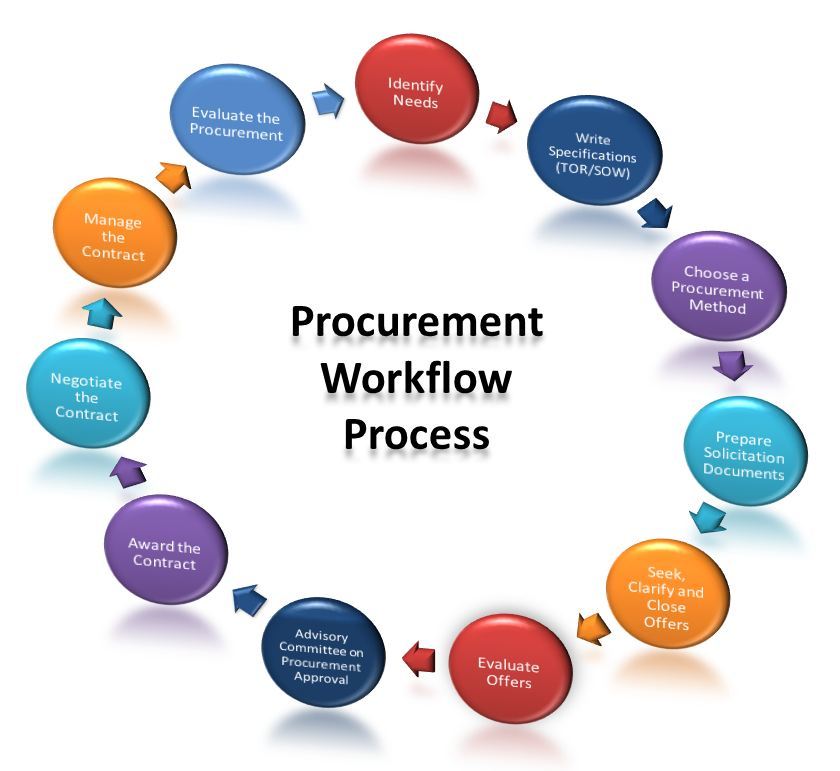
We have all seen the trend of moving towards fewer and fewer firms with the Eversheds and Tyco and Pfizer Legal Alliance examples often offered up as best practice and it is clear looking at press articles that the majority of large organisations have been reducing the number of firms they work with for years now (if not as drastically as cited in these models).
However, in this post I want to explore whether it is in fact beneficial to work with fewer firms...Read more...

